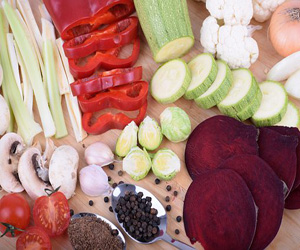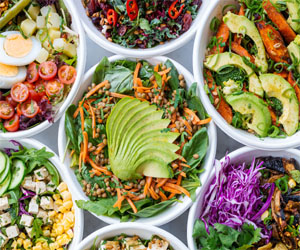


Cultivating A Healthier Planet And Society

The sustainable food movement is a growing global phenomenon that seeks to transform the way we produce, distribute, and consume food. Rooted in principles of environmental responsibility, social equity, and human health, this movement has gained traction as individuals and communities increasingly recognize the importance of making conscious choices about what we eat and how it affects our planet. Here, we explore the key tenets and the transformative potential of the sustainable food movement.
Environmental Responsibility: At the heart of the sustainable food movement lies a profound commitment to environmental sustainability. Traditional industrial agriculture often relies on practices that deplete soil, pollute waterways, and contribute to deforestation. In contrast, sustainable farming methods prioritize responsible land management, biodiversity, and resource conservation. Practices such as organic farming, regenerative agriculture, and permaculture aim to maintain or improve the health of the land and mitigate the impact of food production on climate change.
Local And Seasonal Sourcing: Sourcing food locally and seasonally is another fundamental aspect of the sustainable food movement. This approach is a response to the vast carbon footprint generated by long-distance food transportation. Choosing locally grown and seasonal ingredients reduces greenhouse gas emissions and supports local economies. It also encourages consumers to reconnect with the natural rhythms of their environment and to enjoy a diverse range of fresh, in-season produce.
Reducing Food Waste: The sustainable food movement recognizes the global challenge of food waste. It calls for reducing waste at all stages of the food supply chain, from production and distribution to consumption. By preventing food from going to waste, we conserve resources, reduce the strain on landfills, and address issues of food scarcity and hunger.
Social Equity And Responsibility: Promoting social equity and responsibility is a core value of the sustainable food movement. It encompasses fair labor practices, food access for all, and the eradication of hunger. The movement seeks to eliminate disparities in access to nutritious, affordable food and strives for a world where food is a basic human right, not a privilege.
Healthy Eating: Healthy eating is a vital component of the sustainable food movement. It encourages a diet based on nutrient-dense, minimally processed foods. Sustainable food choices often align with healthier eating patterns, emphasizing fruits, vegetables, whole grains, and lean proteins. This approach not only supports individual well-being but also reduces the burden of chronic diseases on society.
Consumer Awareness: Raising consumer awareness is essential to the success of the sustainable food movement. When individuals understand the impact of their food choices on the environment, local communities, and their health, they are more likely to make informed decisions that align with sustainability goals. Knowledge empowers consumers to vote with their forks and influence the food industry.
Government And Industry Involvement: Government policies and industry practices play a crucial role in promoting food sustainability. Subsidies, regulations, and incentives can either support or hinder sustainable farming and food distribution. Encouraging sustainable practices at the industry level can have a profound impact on the sustainability of our food systems.
The sustainable food movement is not just a trend; it's a global shift toward a more responsible and ethical approach to food production and consumption. It offers a blueprint for a future where food nourishes our bodies and the planet, where it fosters social equity and strengthens local communities. By making mindful choices and advocating for change, we can contribute to a world where food not only sustains us but also cultivates a healthier planet and society.
A Recipe For Health And Convenience
 Meal planning is a culinary skill that has grown in importance over the years, offering numerous benefits for individuals and families. It involves preparing a strategy for what to eat, how to shop, and how to prepare your meals in advance. This proactive approach to food management not only makes life easier but also has profound implications for health, nutrition, and overall well-being.
Meal planning is a culinary skill that has grown in importance over the years, offering numerous benefits for individuals and families. It involves preparing a strategy for what to eat, how to shop, and how to prepare your meals in advance. This proactive approach to food management not only makes life easier but also has profound implications for health, nutrition, and overall well-being.
The Basics Of Meal Planning
Meal planning is a systematic approach to deciding what to eat and when. It typically involves:
Menu Creation: You select the dishes and recipes you'd like to prepare for a set period, whether it's for a week, two weeks, or a month.
Ingredient List: Once your menu is set, you compile a list of all the ingredients you'll need for those meals.
Shopping: Armed with your ingredient list, you go shopping for the items you don't have on hand.
Preparation: You then prepare some components of your meals in advance, like chopping vegetables, marinating proteins, or cooking grains, to streamline cooking during the week.


 One of the most compelling reasons to incorporate meatless options into your diet is the potential for improved health. These options are often lower in saturated fats and cholesterol, making them heart-healthy choices. They are also typically rich in fiber, vitamins, and antioxidants, which can reduce the risk of chronic diseases, aid in weight management, and enhance overall well-being.
One of the most compelling reasons to incorporate meatless options into your diet is the potential for improved health. These options are often lower in saturated fats and cholesterol, making them heart-healthy choices. They are also typically rich in fiber, vitamins, and antioxidants, which can reduce the risk of chronic diseases, aid in weight management, and enhance overall well-being.
Environmental Sustainability
The impact of traditional meat production on the environment is substantial. From deforestation to greenhouse gas emissions, the meat industry has raised concerns about its contribution to climate change. Opting for meatless options significantly reduces your carbon footprint, conserves water resources, and helps protect natural habitats. By reducing the demand for animal agriculture, we can work toward a more sustainable and eco-friendly future.
Ethical Considerations
For many, choosing meatless options aligns with ethical values. Concerns about animal welfare and cruelty in the meat industry have led to the rise of vegetarian and vegan lifestyles. By embracing meatless choices, individuals can make a stand against practices that raise moral and ethical questions, supporting more humane and compassionate treatment of animals.
Nature's Flavorful Treasures
 Health Benefits: Beyond their culinary appeal, aromatic herbs offer an array of health benefits. They are often rich in antioxidants, vitamins, and minerals. For instance, basil contains essential nutrients like vitamin K and iron, which promote bone health and support overall well-being. Rosemary is known for its anti-inflammatory properties and its potential to enhance memory and concentration. Mint aids in digestion and alleviates symptoms of indigestion and irritable bowel syndrome. The list of health benefits associated with aromatic herbs is extensive, making them an integral part of a balanced diet.
Health Benefits: Beyond their culinary appeal, aromatic herbs offer an array of health benefits. They are often rich in antioxidants, vitamins, and minerals. For instance, basil contains essential nutrients like vitamin K and iron, which promote bone health and support overall well-being. Rosemary is known for its anti-inflammatory properties and its potential to enhance memory and concentration. Mint aids in digestion and alleviates symptoms of indigestion and irritable bowel syndrome. The list of health benefits associated with aromatic herbs is extensive, making them an integral part of a balanced diet.
Aromatherapy: Aromatic herbs are not confined to the kitchen; they have a role to play in aromatherapy as well. Essential oils extracted from these herbs are used for their therapeutic properties, promoting relaxation, stress relief, and overall emotional well-being. Lavender, for example, is known for its calming scent, often used to induce sleep and reduce anxiety. Peppermint essential oil is employed to alleviate headaches and soothe muscle pain. Aromatherapy with aromatic herbs is a holistic approach to wellness that harnesses the power of nature's fragrant treasures.
A Key To Health And Enjoyment
 Preventing Dietary Deficiencies: A monotonous diet that lacks variety can lead to nutritional deficiencies. For instance, relying solely on a narrow selection of foods may result in inadequate intake of specific nutrients like vitamin C, calcium, or fiber. Over time, such deficiencies can contribute to health problems. By diversifying your diet, you reduce the risk of missing out on these critical nutrients.
Preventing Dietary Deficiencies: A monotonous diet that lacks variety can lead to nutritional deficiencies. For instance, relying solely on a narrow selection of foods may result in inadequate intake of specific nutrients like vitamin C, calcium, or fiber. Over time, such deficiencies can contribute to health problems. By diversifying your diet, you reduce the risk of missing out on these critical nutrients.
Enhancing Taste And Satisfaction: Food variety doesn't just benefit your health; it also elevates your culinary experience. A diet rich in diverse flavors and textures can make every meal a delightful adventure. Savoring different foods stimulates your taste buds and keeps meals exciting and enjoyable. It can prevent food boredom and discourage overindulgence in less nutritious, but more familiar, options.
Cultural Exploration: Exploring a variety of foods exposes you to different culinary traditions and cultural practices. This exploration can be a delicious way to learn about diverse cultures, fostering a deeper appreciation for the richness and diversity of the world. It also encourages an understanding of the importance of cultural food heritage.
Diverse Nutritional Profiles: Different foods have different nutritional profiles. For instance, leafy greens provide a wealth of vitamins and minerals, while whole grains offer fiber and sustained energy. Lean proteins like fish and poultry are rich in essential amino acids. By incorporating all of these into your diet, you ensure a holistic approach to nutrition that supports all aspects of health.
Elevating Your Life For A Brighter Tomorrow
 One of the cornerstones of lifestyle enhancement is prioritizing physical health. Regular exercise, a balanced diet, and adequate sleep are fundamental. Engaging in physical activities you enjoy, whether it's a daily walk, yoga, or team sports, can be a source of not only fitness but also joy.
One of the cornerstones of lifestyle enhancement is prioritizing physical health. Regular exercise, a balanced diet, and adequate sleep are fundamental. Engaging in physical activities you enjoy, whether it's a daily walk, yoga, or team sports, can be a source of not only fitness but also joy.
Diet plays a crucial role in overall well-being. Opting for whole, unprocessed foods and staying hydrated can make a significant difference in how you feel on a daily basis. Balance is the key; it's essential to allow for occasional indulgences while maintaining a predominantly nutritious diet.
Mental And Emotional Wellness
An enhanced lifestyle also places a strong emphasis on mental and emotional well-being. Mindfulness practices, such as meditation and deep breathing exercises, help manage stress and increase mental clarity.
 A Variety Of Sources
A Variety Of Sources
The good news is that antioxidants are abundant in a wide range of foods, making it easy to incorporate them into your diet. Fruits such as blueberries, strawberries, and pomegranates, and vegetables like kale, spinach, and broccoli are rich in antioxidants. Additionally, nuts, seeds, and certain spices like turmeric and cinnamon also offer an antioxidant punch. Dark chocolate, tea, and red wine, in moderation, are other delightful sources of antioxidants.
Health Benefits Of Antioxidants
The health benefits of consuming antioxidant-packed foods are numerous and well-documented. Here are some of the ways they can enhance your well-being:
Reduced Risk Of Chronic Diseases: Antioxidants can help reduce the risk of chronic diseases, including heart disease, cancer, and diabetes. By neutralizing free radicals, they protect cells and DNA from damage.
Anti-Aging: Antioxidants play a role in skin health by protecting against UV radiation and environmental pollutants, which can accelerate skin aging.